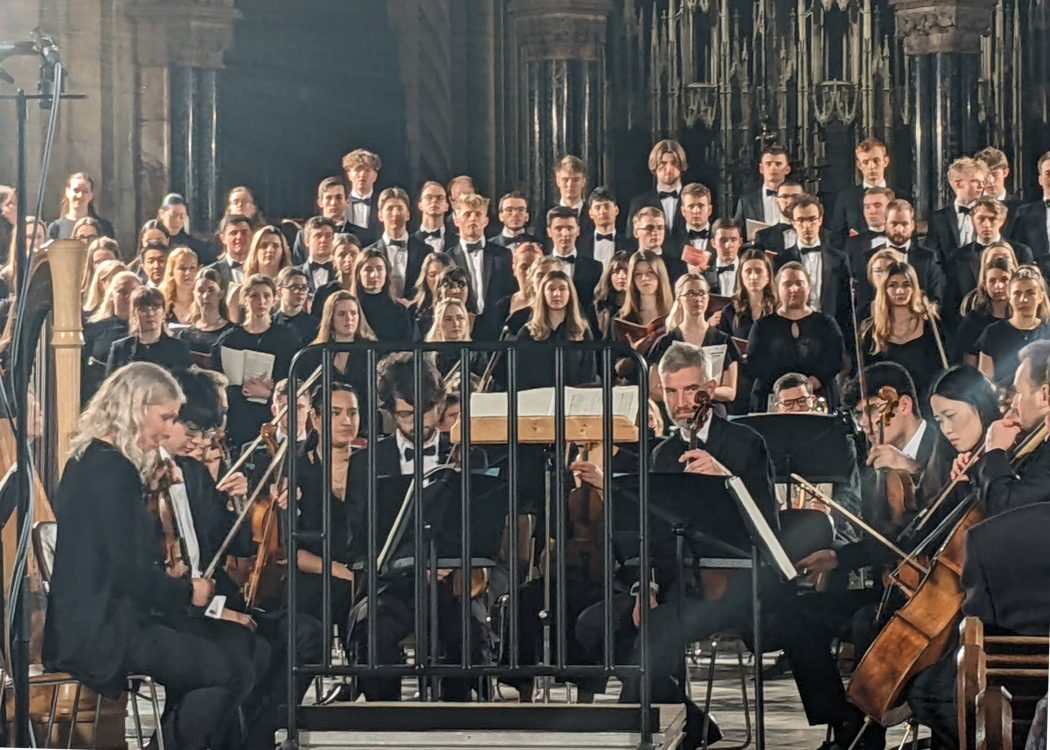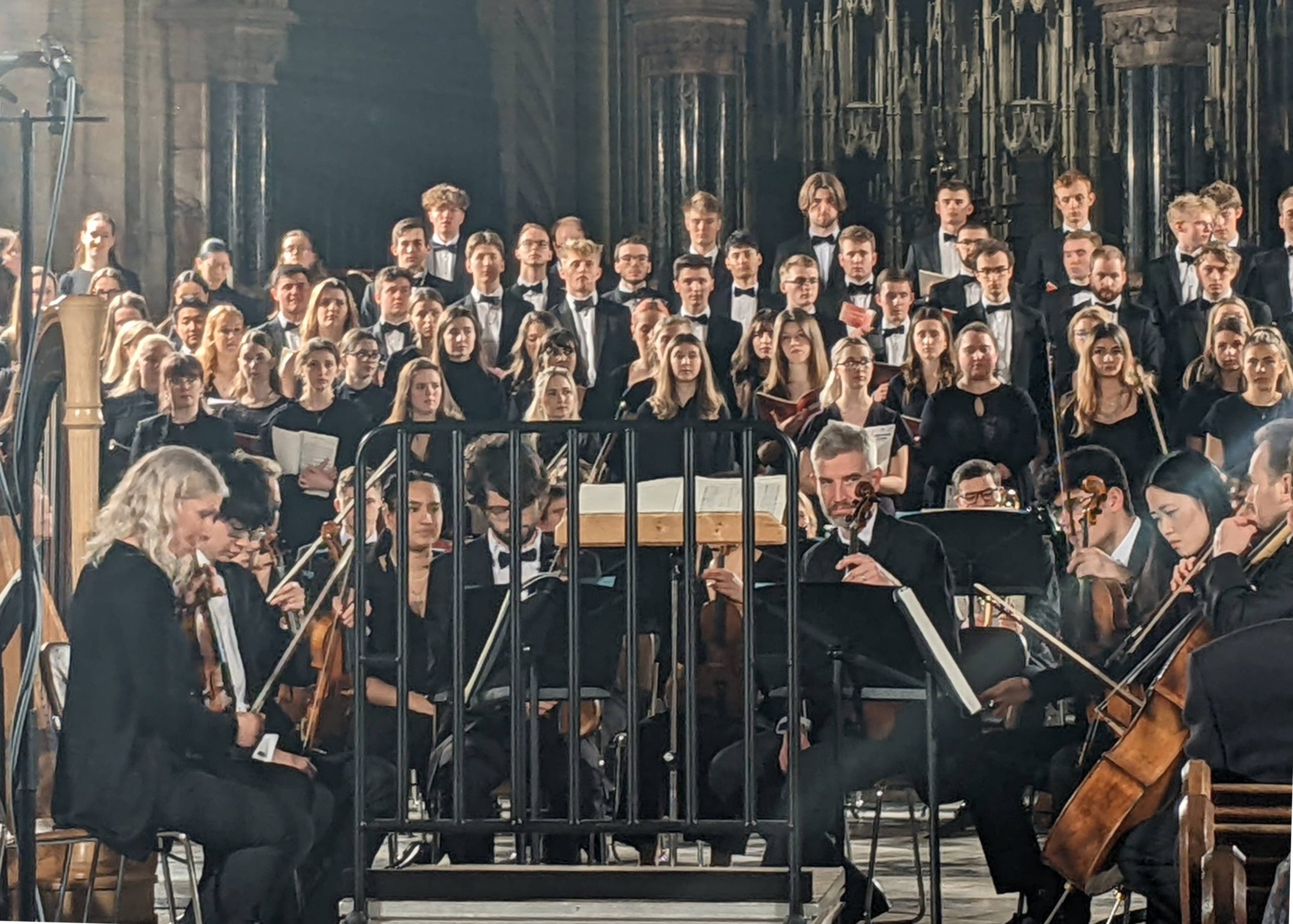Perhaps it was a lucky fluke of programming or perhaps it was the pitch-perfect judgement of someone accurately reading the way our world is heading. However it came about, last night’s performance by Durham University Choral Society, of Bernstein’s Chichester Psalms and Mozart’s Requiem, under their new conductor John Forsyth, with Durham University Orchestral Society, was very much the right thing, at the right time. It gave me a focus for the turmoil of emotions that have been battering my head as a result of international tragedy and tragedy within my own life. Music doesn’t have the answers, but I found this evening that it gave me new ways of thinking about the questions.
Like so many other concerts across the world at the moment, this began with prayers and silence for Ukraine, followed by the choir singing the Ukrainian national anthem, and, in what I thought was a really nice touch, they did this from the cathedral transepts, taking the focus off the singers – somehow the empty platform made the moment all the more poignant.
John Forsyth is something of a legend in the North East. He has done extraordinary work for years nurturing young singers in Teesside so I was very excited to learn that he was taking over the helm at DUCS – and even prior to this concert I have been hearing what a transformational effect he has already had on the choir, bringing the group back to life after lockdown bigger and stronger than it has been for years. The results were on display this evening with singing that was both electrifying and tightly disciplined and the fact that many of the excellent soloists came from within the choir is indicative of its quality.
Under ordinary circumstances, Mozart’s frothy Missa Brevis in D would have been just a filler to pad out the first half, but this time it was a useful opportunity after the power of the anthem to regroup and settle before weightier things. It was performed by a small group from the choral society accompanied by the Frankland Quartet – all long-time members of Royal Northern Sinfonia and quartet in residence at Durham University – and a chamber organ. This was a delightful performance, full of bubbles in the lively parts of the Gloria and Credo contrasting with a quiet glow at other moments – the Sanctus in particular lit up the cathedral with a ray of sunshine. There was strong and well-matched singing from quartet of step-out soloists – the duet sections between soprano and mezzo then tenor and bass were particularly enjoyable, as was soprano Hannah McKay’s agile ‘dona nobis pacem’.
During the stage re-set after the Missa Brevis, choir member Chessy Weiner gave a moving introduction to the Chichester Psalms, guiding us through the Hebrew texts and talking about how humanity is built on shared connections and she drew nice parallels with Bernstein’s best known work, West Side Story, that ends with people coming together. It’s probably no accident that Bernstein chose three psalms that have strong resonances in Christian worship and culture – Psalm 100 (generally known to us as the Jubilate), Psalm 23 (the Lord is my Shepherd), and Psalm 2 (Why do the nations rage) – by taking us back to their Jewish origins he reminds us of shared heritage across what we think are religious and cultural barriers.
The opening call to worship from psalms 108 and 100 was wild and joyful, bursting with energy from singers and orchestra – even the soloists did not step out but ran enthusiastically from the choir to their positions.
This was the first time we had heard the full choir and it was utterly thrilling. Psalm 23, ‘The Lord is my Shepherd’, sung by upper voices and soloists was warmly consoling, until the tenors and basses brought war crashing in with relentless brutality. The moment when the top voices resumed, still singing through the wreckage, could have been the cries in the ruins of any destroyed city, from ancient Jerusalem to today’s Mariupol.
I have no idea about how Hebrew should be pronounced, but the choir’s diction was excellent so it was easy to keep track of where we were in the text – although the intention and colour was so clear, I barely needed to look at the text anyway. The final section of Chichester Psalms speaks of reconciliation and peace, but the bitter darkness of the strings suggested that this was an uneasy peace, full of fear that it will all happen again. The finale chorale ‘How good and how pleasant it is that brothers dwell together’ was sung very simply, with a heartbreaking trumpet solo from Clara Falkowska floating above the text. I was glad that John Forsyth gave us a long silence to process this before laying down his baton for the rapturous applause.
The sense of a tense, uneasy peace resumed in the opening Kyrie of Mozart’s Requiem, the orchestra agitated under the choir’s urgency. Throughout the Requiem, the choir made a solid, exciting sound where needed and produced nicely shaped phrasing in the quieter sections. The fugues were well-balanced with each part coming through clearly, although in the Hosannas, there did seem to be a three-way discussion going on between choir, orchestra and conductor about what the tempo should be. I loved the gentle rock of the Lacrymosa, building up to a really heartfelt ‘dona eis requiem’ and an utterly gorgeous ‘sempiterna requiem’ at the end of the Agnus Dei, setting up another ray of light for the ‘Lux aeterna’. There was a nice touch in the ‘Quam olim Abrahim’ section of ‘Domine Jesu’ where the choir almost died away, in what to me felt like doubt about whether God really keeps his promises and a reminder again of ruined cities, but here the doubt was eventually overcome when the section returns at the end of ‘Hostias’.
There was excellent singing throughout from the quartet of soloists – soprano Hannah McKay, mezzo-soprano Eleanor Dean, tenor Benedict Munden and bass Jamie Goodwyn. I was lucky to get a seat in the best part of the cathedral for sound, but I’m confident that all four carried effortlessly right to the very back seats that were added round the font after the nave tickets sold out. All four singers were engaging to watch and delivered lots of character, particularly, I felt, in the Recordare. From where I was sitting, I was also able to enjoy John Forsyth’s excellent balance between choir and orchestra – I’m sure I heard detail in the strings that I’ve not noticed before. Trombonist Chris Chung floated out a flawless legato in the ‘Tuba mirum’ solo – I’m always nervous for the player before that bit but this was assured playing that did the trick of sounding effortless.
As the opening theme returned in the final Agnus Dei fugue, the sense of urgency became even stronger but built into a powerful statement of confidence that gives us something to cling onto even as the light dims and the darkness closes in.









